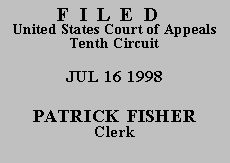

| RICHARD C. WHITE, | No. 97-1370
(D.C. No. 96-M-2331) (Colorado) |
Richard White filed petition for writ of habeas corpus under 28 U.S.C. § 2254. The matter was referred to a magistrate judge who recommended dismissal on the ground that petitioner had filed a "mixed petition" containing exhausted and unexhausted claims. The district court issued an order denying the writ and dismissing the action. We agree and affirm.(1)
Mr. White was convicted in Denver District Court in 1993 of two counts of sexual assault on a child and one count of intimidating a witness, for which he sentenced to a total of ten years in prison. The Colorado Court of Appeals affirmed the conviction and sentence on direct appeal and the Colorado Supreme Court denied certiorari. Mr. White then filed for post-conviction relief in the Denver District Court. When that motion was denied, Mr. White appealed to the Colorado Court of Appeals, which reversed the trial court and remanded for an evidentiary hearing. Mr. White's motion for post-conviction relief, for which he has been afforded state-appointed counsel, is still pending in state court and encompasses many of the claims Mr. White is attempting to raise in his section 2254 petition.
A "mixed petition", which contains exhausted and unexhausted claims, must be dismissed. See Rose v. Lundy, 455 U.S. 509, 510 (1982); Harris v. Champion, 15 F.3d 1538, 1555 (10th Cir. 1994). Mr. White attempts to avoid this bar by asserting that his post-conviction relief proceeding has been deliberately delayed, thereby excusing him from exhausting his state remedies. We have held that "excessive and inexcusable delay" in a state direct appeal may excuse the exhaustion requirement. See Harris, 15 F.3d at 1555. Here the alleged delay is in a state post-conviction proceeding to which Mr. White has no federal constitutional right. See Pennsylvania v. Finley, 481 U.S. 551, 556-57 (1987). Moreover, any delay in the scheduling of Mr. White's evidentiary hearing has been caused primarily by a continuance requested by his own counsel, as well as by Mr. White's differences of opinion with prior counsel. Mr. White is not entitled to circumvent the exhaustion requirement as a remedy for his unhappiness with his counsel, especially given the fact that he has no constitutional right to post-conviction counsel at all. See Coleman v. Thompson, 501 U.S. 722, 752 (1991); Pennsylvania v. Finley, 481 U.S. 551, 555-56 (1987); Smith v. Sec'y of New Mexico Dep't of Corrections, 50 F.3d 801, 821 n.29 (10th Cir. 1995). Mr. White has made no showing that he would not be allowed to proceed in this matter without counsel if he so chooses.(2)
On any application for collateral review, a certificate of appealability will issue only if the "applicant has made a substantial showing of the denial of a constitutional right." Lennox v. Evans, 87 F.3d 431, 433 (10th Cir. 1996). There has been no unconstitutional delay in the state post-conviction proceeding. Not only does Mr. White have an available avenue for relief in state court, he may also return to federal court upon exhausting those avenues if he fails to obtain the relief he seeks.
The certificate of appealability is DENIED and the appeal is DISMISSED.
ENTERED FOR THE COURT
Stephanie K. Seymour
Chief Judge
*.This order and judgment is not binding precedent, except under the doctrines of law of the case, res judicata, or collateral estoppel. The court generally disfavors the citation of orders and judgments; nevertheless, an order and judgment may be cited under the terms and conditions of 10th Cir. R. 36.3.
1.We grant Mr. White's motion to supplement the record on appeal.
2.Mr. White complains that the Colorado courts have refused to entertain his pro se motions while he is represented by counsel. While Mr. White cannot represent himself so long as he has counsel, we find nothing in the record indicating that the Colorado courts would deprive Mr. White of the opportunity to represent himself if he elected to forego counsel.